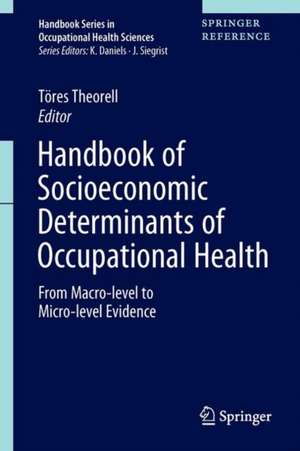Handbook of Socioeconomic Determinants of Occupational Health: From Macro-level to Micro-level Evidence: Handbook Series in Occupational Health Sciences
Editat de Töres Theorellen Limba Engleză Hardback – 13 aug 2020
The anthology starts in the macro level sphere – with international perspectives and reviews related to working conditions in relation to political change (the fall of the Soviet Union) gender, age, precarious employment, national economy and retirement. Two chapters relate to national policies and activities in international organizations.
The second part of the book relates to the meso level sphere – with reviews onsocial patterns in distributions of psychosocial and physical risks at work in general as well as reviews on noise, shift work, under/overemployment, occupational physical activity, job intensity (which may be a particularly important problem in low income countries), digitization in modern work, climate change, childhood determinants of occupational health in adult years and theoretical models currently used in occupational epidemiology - demand/control, effort/reward, organizational justice, psychosocial safety climate, conflicts, bullying/harassment. This part of the book ends with two chapters on interventions (one chapter on the use of cultural interventions and one on interventions and their evaluation in general) and two chapters on financial aspects of poor/good work environments and evaluations of interventions.
In the third part of the book the micro level is addressed. Here mechanisms translating working conditions into physiology are discussed. This starts in general theory relating basic theories regarding energy storage and release to psychosocial theory (extension of demand control theory). It also includes regeneration physiology, autonomic nervous system function, immunology and adverse behaviour.
Sections in the Handbook:
Macro-level determinants of occupational health: Akizumi Tsutsumi,
Meso-level determinants of occupational health: Morten Wahrendorf and Jian Li,
Micro-level determinants of occupational health: Bradley J. Wright
Preț: 1506.06 lei
Preț vechi: 1981.65 lei
-24% Nou
Puncte Express: 2259
Preț estimativ în valută:
288.28€ • 313.24$ • 242.31£
288.28€ • 313.24$ • 242.31£
Carte tipărită la comandă
Livrare economică 17-23 aprilie
Preluare comenzi: 021 569.72.76
Specificații
ISBN-13: 9783030314378
ISBN-10: 3030314375
Pagini: 701
Ilustrații: XXIII, 701 p. 37 illus., 11 illus. in color.
Dimensiuni: 155 x 235 mm
Greutate: 1.54 kg
Ediția:1st ed. 2020
Editura: Springer International Publishing
Colecția Springer
Seria Handbook Series in Occupational Health Sciences
Locul publicării:Cham, Switzerland
ISBN-10: 3030314375
Pagini: 701
Ilustrații: XXIII, 701 p. 37 illus., 11 illus. in color.
Dimensiuni: 155 x 235 mm
Greutate: 1.54 kg
Ediția:1st ed. 2020
Editura: Springer International Publishing
Colecția Springer
Seria Handbook Series in Occupational Health Sciences
Locul publicării:Cham, Switzerland
Cuprins
The impact of socio-political upheaval: Russia and Eastern Europe.- Precarious employment in low and middle income countries.- Downsizing, restructuring and ‘survivor disease’.- Interactions of work and health: an economic perspective.- Gender perspectives on employment and health.- Impacts of climate change on working people.- Social inequalities in health in older people or people after retirement.- Social inequalities in the transition from work to retirement.- From national labor, economic and social policies to individual working conditions: multilevel concepts, evidence and challenges.- The role of international organizations.- The social distribution of occupational hazards.- Occupational noise.- Shift work.- Long working hours.- Under- and over-employment.- Physical activity at work.- Job insecurity.- Job intensity: evidence from high income countries.- Job intensity: evidence from middleand low income countries.- Impact of digitalization on work and employment.- Early life conditions and critical employment trajectories.- Demand-control-support.- Effort-reward imbalance.- Organizational injustice.- Job demands and resources.- Psychosocial safety climate.- Social conflicts and offense to self.- Work-life balance: Definitions, Causes, and Consequences.- Job interventions for improvement of management by means of art experiences.- Organizational-level interventions.- Financial gains, possibilities and limitations of improving occupational health at the company level.- Health economic evaluation of workplace health promotion.- Stress disequilibrium.- Regenerative physiology counteracting damaging effects of long-lasting energy mobilisation.- Work stress and autonomic nervous system activity.- Work stress, immune and inflammatory markers.- Work stress and health-adverse behaviors.
Notă biografică
Töres Theorell M.D., Ph.D., became a physician in 1967 and has served in internal medicine, cardiology, and social medicine. His Ph.D. thesis subject in 1971 was critical life events in relation to myocardial infarction. He became professor of health care research in 1980 and professor of psychosocial medicine at the Karolinska Institute in 1995. After his retirement in 2006 he has been a scientific advisor at the Stress Research Institute at the University of Stockholm. Theorell’s research areas have been epidemiology of psychosocial factors in relation to cardiovascular and psychiatric disease, endocrinological and cardiovascular stress mechanisms, and intervention research. Theorell has published 755 scientific articles and books/book chapters. 470 of those are available in the international medical data base medline (pubmed). He is a member of the Academia Europeae. During later years, he published research in the area of health effects of cultural activities.
Textul de pe ultima copertă
This handbook provides a summary of more than two decades of international research on one of the leading theoretical models of work stress research; effort-reward imbalance. Consisting of 3 parts and 8 sub-parts, this essential reference work deals with theory and methods, review of research evidence on health effects, new findings from Asia, Australia, and Latin America, and model extensions and interventions. This book has a selective theoretical focus, and the large majority of chapters is restricted to the meso-level of organizational research. With a combination of research evidence derived from macro-, meso- and micro-level investigations, the inclusion of a broad spectrum of material and psychosocial occupational stressors, and with its unique focus on socioeconomic determinants this handbook offers a valuable source of information to a broad audience interested in occupational health science.
Caracteristici
Covers link between effort-reward imbalance and work stress Integrates key macro-, meso- and micro-level research Features unique focus on socioeconomic determinants Includes supplementary material: sn.pub/extras



